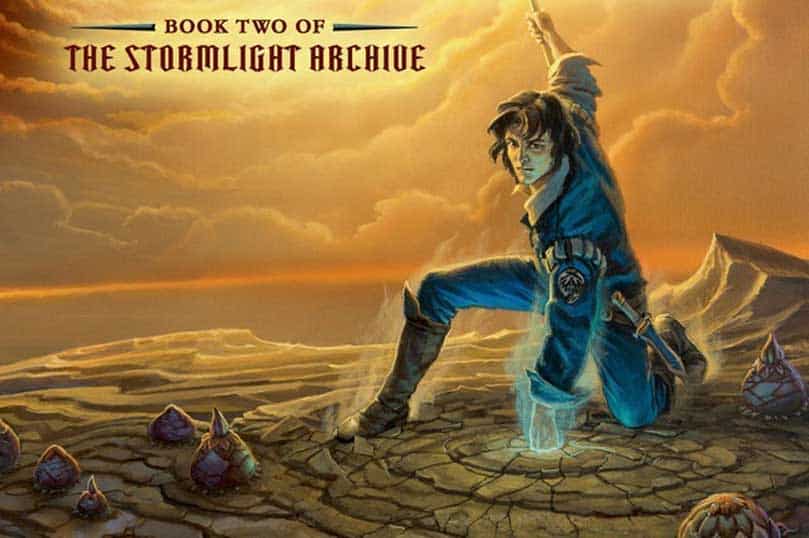
Fiction has the potential to introduce questions and engage the mind in philosophy in ways nonfiction simply can’t. Nonfiction has its strengths, but it often doesn’t have the extensive worldbuilding and character development it needs to immerse the reader into the conflict.
Fiction, especially fantasy, has a way of presenting moral predicaments that holds the reader’s attention. Stories can get readers thinking about morality as the characters interact with—and make choices that are—good and evil.
Like many of the fantasy giants that have come before him, Brandon Sanderson infuses his writing with moral themes that spark emotion in the characters—and the readers.
I’m currently halfway through reading Oathbringer, the third book in Sanderson’s The Stormlight Archive, and one of the lead characters, Kaladin Stormblessed, is plagued with answering the question: does objective morality exist? And consequently, does true honor exist?
Having been inspired by a scene in Oathbringer, I’m going to walk through Kaladin’s dilemma and attempt to answer his question.
Background information on the story
If you are unfamiliar with The Stormlight Archive, here is some brief background information on the characters and the scene I’m about to show you.
(There are major spoilers for The Way of Kings and Words of Radiance below, so read at your own risk.)
In the world of Roshar, spren are fairy-like creatures that are, essentially, concepts and ideas personified. Emotions might take the form of golden orbs (gloryspren) or falling snowflakes (passionspren). When one creates a lot of art, creationspren crop up in the shape of random objects. Every object, idea, and concept has a spren, which has been created by mankind’s collective perception of that object, idea, or concept. Long story short, Kaladin has bonded one of these spren and due to this bond, now receives special powers.
Since she’s an honorspren, Syl bonded with Kaladin because he is honorable. He has the desire to do what’s right and, as a soldier, protect as many people around him as possible. In order to stay bonded to Syl and wield the powers that come with the bond, Kaladin must remain honorable.
(Last warning. There are major spoilers for Words of Radiance below, so read at your own risk.)
However, in Words of Radiance, Kaladin is presented with an opportunity to take revenge on those who have wronged him and people he cares about. He can either sit back and let an unjust king be killed or he can do what’s right and defend the man, Elhokar, because he has sworn to. He almost sacrifices Elhokar’s life on the altar of revenge, nearly severing his bond with Syl and losing his powers. In the end, he chooses to protect Elhokar, restoring his bond with Syl and regaining his abilities.
In Oathbringer, Kaladin recalls the events of book two. He asks Syl why it was wrong for him to let an unjust man die, but it wasn’t wrong for him to kill enemy soldiers when he was in the military. Kaladin wonders if he has to adhere to objective morality—if honor and integrity are even real—or if he is merely heeding Syl’s opinions.
Kaladin and Syl’s conversation
The following scene is taken from Oathbringer, part I, chapter 31.
‘You changed your mind about Elhokar, Kaladin. You saw what was right.’
‘Did I? Did I find what was right, or did I just finally agree to see things the way you wanted?’
‘Killing Elhokar was wrong.’
‘And the parshmen on the Shattered Plains that I killed? Murdering them wasn’t wrong?’
‘You were protecting Dalinar.’
…
Kaladin turned toward Syl, who sat on his shoulder, one leg tucked beneath her. ‘So what’s the difference, Syl? What is the difference between Dalinar attacking the parshmen, and these parshmen conquering that city?’
‘I don’t know,’ she said softly.
‘And why was it worse for me to let Elhokar be killed for his injustices than it was for me to actively kill parshmen on the Shattered Plains?’
‘One is wrong. I mean, it just feels wrong. Both do, I guess.’
‘Except one nearly broke my bond, while the other didn’t. The bond isn’t about what’s right and wrong, is it, Syl. It’s about what you see as right and wrong.’
‘What we see,’ she corrected. ‘And about oaths. You swore to protect Elhokar. Tell me that during your time planning to betray Elhokar, you didn’t—deep down—think you were doing something wrong.’
‘Fine. But it’s still about perception.’ Kaladin let the winds blow him, feeling a pit open in his belly. ‘Storms, I’d hoped…I’d hoped you could tell me, give me an absolute right. For once, I’d like my moral code not to come with a list of exceptions at the end.’
She nodded thoughtfully.
‘I’d have expected you to object,’ Kaladin said. ‘You’re a…what, embodiment of human perceptions of honor? Shouldn’t you at least think you have all the answers?’
‘Probably,’ she said. ‘Or maybe if there are answers, I should be the one who wants to find them.’
Oathbringer, Part I, Chapter 31
What I love about this scene is that it’s real. Kaladin is asking his spren, his friend, why he must obey her (and his) sense of honor even though he has no assurance that it’s correct. He isn’t even certain if he has to obey a perception of honor or a true, absolute honor.
This can only cause him internal turmoil. After all, Kaladin is bound to be honorable, but how is he supposed to do that if he doesn’t know what constitutes honor?
Sanderson doesn’t answer Kaladin’s question right away, which I appreciate. I think if he rushed to Kaladin’s aid and gave him the answer he wanted to hear, then it would have felt like the author was forcing his own interpretation on the reader; it would have jarred me from the story a bit. I don’t think the characters’ knowledge or experiences allow Sanderson to answer this question just yet.
Sanderson might address Kaladin’s predicament with an addition to the series’ lore or he might let the question hang in the air. Regardless of how Sanderson chooses to answer the question, I thought I’d provide an explanation that applies not to Roshar but the real world.
Subjective vs. objective morality
Different philosophies often categorize morality as either subjective or objective. Subjective morality purports that there are no universal, objective moral truths. Instead, morality depends on individual perspectives and cultural norms. No moral statement is correct or incorrect.
On the other hand, objective morality takes a different approach. It states that there are moral laws that exist outside of opinion. This is the kind of morality Kaladin desires, one that isn’t dependent on his and Syl’s “perspectives” and one where there isn’t a “list of exceptions at the end.” It’s also the kind of morality that I believe exists in the real world, regardless of how Sanderson chooses to portray morality in the rest of Oathbringer and the The Stormlight Archive.
The conscience as an argument for objective morality
First and foremost, the reason I believe in an objective moral law is because I have felt it in the form of my conscience. Every single human being has a conscience, and it is no coincidence that everyone’s conscience tends to guide them in the same direction. We intrinsically cringe and feel shame and guilt when we lie, cheat, hurt others, and commit various other sins. God has written his law on the hearts of men and our consciences are evidence of that (Romans 2:14-15; Hebrews 8:10; Jeremiah 31:33).
Some may say that our consciences are a result of evolution and that our gut responses to moral scenarios are a result of genetics. But that assumes our conscience can be influenced by the physical. That rhetoric does not take into account our souls, which are distinct from our mind and body and cannot be touched by genetics.
And if you believe that those intrinsic gut reactions are merely biological, then why would those same gut reactions ever tell us to do something that might hurt us or what our other instincts are screaming at us not to do?
In his book Mere Christianity, C.S. Lewis gives the example of helping someone in danger to illustrate this. If a man is drowning and calling out for help, another man may feel two instincts: 1) the desire to help due to herd instinct; 2) the desire to avoid danger. But he also feels a third instinct: 3) the obligation to help. This third instinct is not because he wants to help, but that he knows he ought to.
In this scenario, if the man helps the drowning man, he is endangering his own life. He is rebelling against his self-preservation, possibly because he wants to help the man, but certainly because he knows it’s the right thing to do.
This is where the very idea of integrity comes from. We don’t always do the right thing because we want to or because our biological instincts are telling us to; sometimes, we do the right thing because it is right. This has nothing to do with our biology.
In Words of Radiance, Kaladin didn’t spare Elhokar’s life because he wanted to. He had very strong urges not to; in fact, it would have been in his favor to let Elhokar die. And yet he saved his life. I’m willing to bet thousands of readers would agree that Kaladin made the right decision. But how would they know that was the right decision if not for their consciences?
Similarly, it is our consciences that tell us to suppress or enable our other instincts. For example, everyone has the instinct to have sex and reproduce. This instinct is neither good or bad in and of itself. Sometimes it’s morally right to have sex given the situation; other times it’s not. Other instincts may temporarily override this one, but no biological instinct can tell you when sex is morally right or wrong. That’s your conscience. If your conscience is just another instinct, then how can it tell us when acting on our other instincts is right or wrong?
In fact, there is not a single biological instinct that our conscience doesn’t seek to keep in check. This proves our consciences exist apart from our biological instincts. If our consciences are real, they must attest to an objective moral law.
How moral disagreements indicate an objective moral law
Secondly, moral disagreements cannot take place if there is not an objective law to refer to.
The very act of holding your own morals means that you believe your morals are superior to someone else’s. Why else would you be holding different morals then? If all morals are equally correct, then why disagree with anyone at all? Why not adopt someone else’s moral code?
If you believe your morals are more correct than someone else’s (which you do just by holding them), then you are acknowledging that there’s an objective law that validates your moral stance and invalidates someone else’s.
This objective set of morals enables you to disagree with anyone morally in the first place. No one has perfect morals, but some people have morals that more closely resemble the objective moral law than others do.
The emptiness of subjective morality
No one actually believes in subjective morality. If you say you do, hear me out. When someone wrongs you, why do you get mad? Why do you declare that they are in the wrong when they are likely acting according to their own morality?
With subjective morality, everyone can be right in their own eyes. If that’s the case, you shouldn’t hold it against someone if they don’t follow your personal moral code. And yet you do. You don’t like it when someone lies to you, cheats on you, hits you, or steals from you because all of these things are wrong.
In these cases, what are you appealing to? Your personal moral code or a natural law that declares right and wrong? Only one of those options holds the perpetrator accountable.
If everyone has their own morality, then we can’t judge anyone’s actions at all. With this mindset, no one can be in the wrong in their own eyes, and since there’s no objective code to judge by, no action can truly be wrong.
This philosophy permits great evils such as murder, rape, incest, and torture to be seen as good, since morals are only mere opinions. If the majority of a society sees these atrocities as good, does that make them good?
This just goes to show that subjective morality is empty. It permits everything and prohibits nothing.
While this point alone may not declare an objective moral law the truth, it highlights mankind’s need for one.
The answer to Kaladin’s question
In the real world, there is an objective moral law. It’s what gives honor and integrity a place in men’s hearts. If Roshar is the same, then yes, Kaladin heeds true honor, true justice—or at least, Sanderson’s interpretation of such.
In the end, I do not know all the answers about morality and God. But I hope what I wrote here is enough to address Kaladin’s situation and inspire others to form their own opinions on the matter.
Of course, I can’t wait to read about how Sanderson addresses the matter in Oathbringer—if he even does. Regardless, let’s remember Syl’s words: We may not have the answers ourselves, but if they’re out there, we ought to find them.

